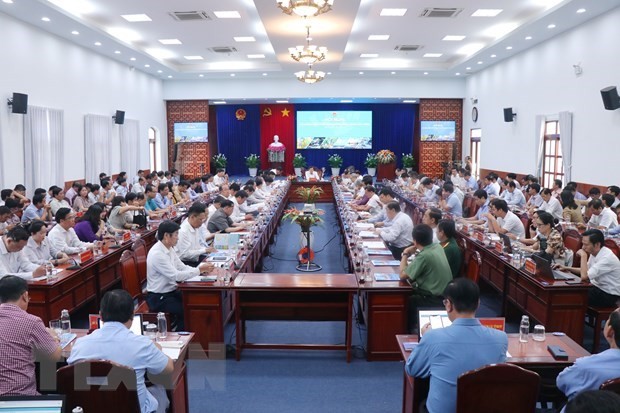
Deputy PM chairs first meeting of Coordinating Council for Mekong Delta region
Latest
 |
| At the meeting (Photo: VNA) |
At the meeting, which saw the participation of officials from central agencies and representatives from 13 regional localities, participants discussed specific mechanisms and policies for the region’s development, as well as the connectivity and coordination among projects that promote intra-regional and inter-regional links.
Deputy Prime Minister Khai affirmed the meeting was an opportunity to promote the potential and strength of the region, and put forward solutions to existing problems.
He highlighted the region's particularly important strategic position in terms of economy, culture, society, environment, defence, security, and foreign affairs of the country.
According to the Deputy Prime Minister, located in the country's southernmost part, the Mekong Delta region is a bridge connecting Vietnam with other countries in ASEAN, especially those in the Mekong Subregion. It is also the country's key agricultural region with various key products, especially rice, shrimp, tra fish, and fruits, and plays a huge role in the ecological environment, water security, and food security for the whole country.
Chairman of the Bac Lieu provincial People's Committee Pham Van Thieu said the Mekong Delta is the country's largest agricultural production hub, contributing 50% of total rice production and 95% of rice exports, 65% of aquaculture production, 60% of fish exports, and nealry 70% of fruit output.
He stressed the need to have a synchronous, effective coordinating mechanism in line with law and planning approved by competent authorities for the region's fast and sustainable development.
Regarding orientations for the council in the near future, Deputy Prime Minister Khai urged ministries, sectors and regional localities to take specific actions to improve the operational efficiency of the regional coordinating council with a focus on modern, large-scale agricultural production, organic ariculture, the processing industry, preservation of agricultural and aquatic products, and product brand development.
He also urged the localities to promote economic restructuring, especially agricultural structure suitable for each ecological area, effectively implement projects related to climate change adaptation. Other key tasks are to solve riverbank and coastal erosion, subsidence, saltwater intrusion, and drought, while developing a comprehensive strategy for protection and sustainabl use of Mekong River water resources.
In July and August 2023, Prime Minister Pham Minh Chinh signed decisions on the establishment of coordinating councils for six regions across the country - the Red River Delta region, the North Central and Central Coast region, the Southeast Region, the Central Highlands Region, Mekong Delta region and the Northern Midland and Mountainous region.
The Councils are responsible for coordinating linking activities for regional socioeconomic and infrastructure development, with priority given to transport infrastructure. They will study and propose the formation of a fund for regional infrastructure development.

























